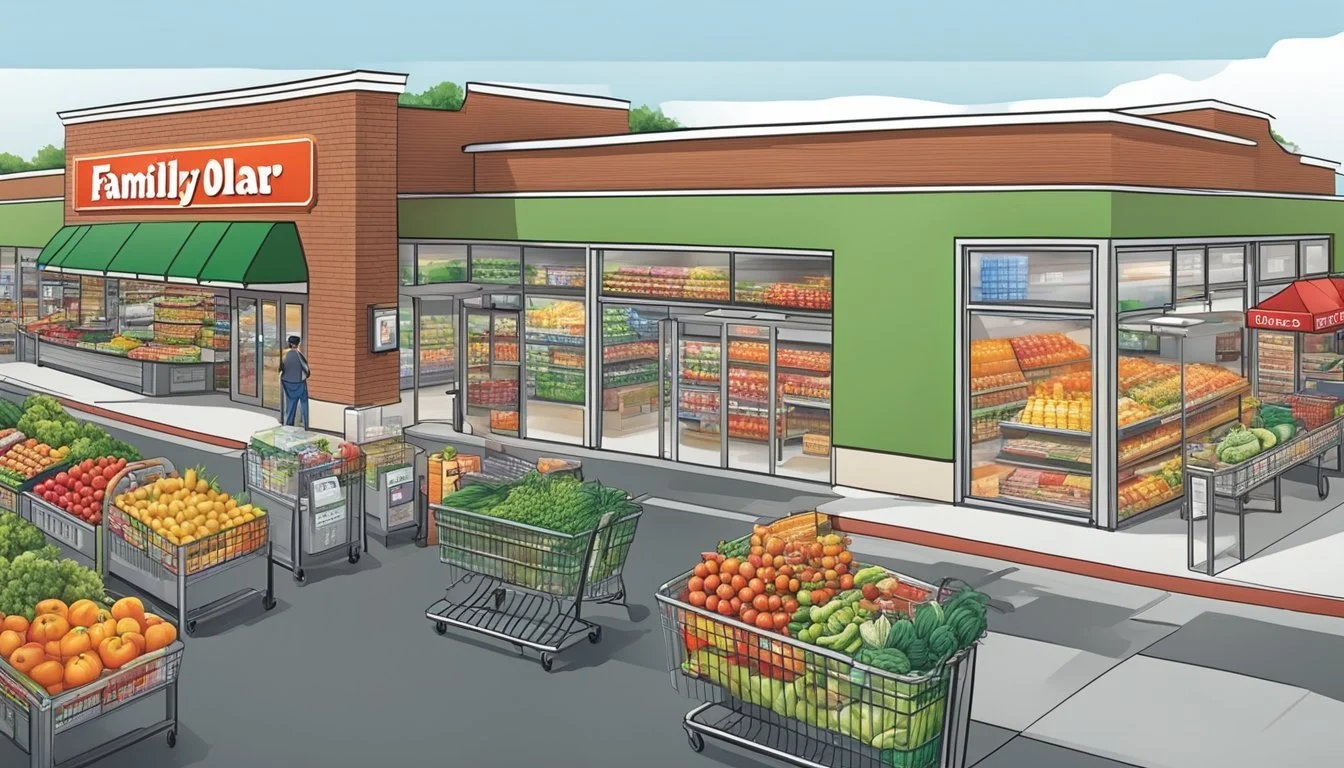Family Dollar vs Hy-Vee
A Comprehensive Comparison of Price and Quality
Family Dollar and Hy-Vee are two distinct grocery store chains catering to different segments of the market. Family Dollar focuses on providing budget-friendly options for everyday essentials, while Hy-Vee offers a more comprehensive grocery shopping experience with a wider range of products and services.
For shoppers primarily concerned with cost savings, Family Dollar may be the better choice, but Hy-Vee often provides higher quality and a broader selection of fresh produce and prepared foods. Family Dollar's strength lies in its competitive pricing on household items and non-perishables, making it an attractive option for budget-conscious consumers.
Hy-Vee, on the other hand, emphasizes customer service and store experience. The chain offers various store formats to suit different community needs, including convenience stores and specialized alcohol outlets. This flexibility allows Hy-Vee to maintain a presence in areas where a full-size supermarket might not be feasible, potentially giving it an edge in terms of accessibility for some shoppers.
Company Overviews
Family Dollar and Hy-Vee are two distinct retail chains with unique histories and market positions. Both have grown significantly over the decades to become major players in their respective segments of the grocery and discount store industry.
History of Family Dollar
Family Dollar was founded in 1959 by Leon Levine in Charlotte, North Carolina. The company started as a single store offering low-priced merchandise. By the 1970s, Family Dollar had expanded to over 100 stores.
The chain experienced rapid growth in the 1980s and 1990s, reaching 1,500 stores by 1992. Family Dollar went public in 1970, trading on the NYSE.
In 2015, Dollar Tree acquired Family Dollar for $8.5 billion. The merger created one of the largest discount store chains in North America. Today, Family Dollar operates over 8,000 stores across 46 states, offering a mix of groceries, household items, and apparel at discount prices.
History of Hy-Vee
Hy-Vee traces its roots back to 1930 when Charles Hyde and David Vredenburg opened a small general store in Beaconsfield, Iowa. The name "Hy-Vee" was adopted in 1952, derived from a combination of the founders' names.
The company incorporated as Hy-Vee Food Stores in 1938 with 15 stores. Expansion continued steadily over the following decades. Hy-Vee introduced in-store pharmacies in the 1960s and gas stations in the 1990s.
Hy-Vee remains employee-owned, a status it has maintained since 1960. The chain is known for its focus on customer service and health initiatives. Today, Hy-Vee operates over 275 stores across eight Midwestern states.
Market Presence
Family Dollar has a wider geographic reach, with stores in 46 states. The chain focuses on urban and rural areas, often serving communities with limited retail options. Family Dollar stores are typically smaller format, averaging 7,000-9,000 square feet.
Hy-Vee's presence is concentrated in the Midwest, covering eight states. The chain operates larger supermarket-style stores, averaging 60,000-80,000 square feet. Hy-Vee stores offer a broader range of products and services, including full-service pharmacies and restaurants in many locations.
Both chains have adapted to changing market conditions. Family Dollar has increased its grocery offerings, while Hy-Vee has expanded into convenience store formats and specialized alcohol outlets.
Product Range and Quality
Family Dollar and Hy-Vee offer distinct product ranges and quality levels. Their selections cater to different customer needs and preferences across various departments.
Fresh Produce
Hy-Vee provides a wider variety of fresh fruits and vegetables compared to Family Dollar. The supermarket chain offers organic options and locally sourced produce when available. Hy-Vee's produce department typically features higher quality items with better freshness and appearance.
Family Dollar's produce selection is more limited, focusing on basic staples like bananas, apples, and potatoes. The quality can be inconsistent, but prices are generally lower than Hy-Vee's.
Meat and Seafood
Hy-Vee excels in this category with full-service meat and seafood counters. Customers can find a diverse range of cuts, including prime beef, poultry, pork, and fresh seafood. Hy-Vee often provides higher-grade meats and offers custom cuts upon request.
Family Dollar's meat selection is restricted to pre-packaged items, primarily frozen or processed meats. The store does not typically carry fresh seafood options.
Bakery and Deli
Hy-Vee features in-store bakeries producing fresh bread, pastries, and custom cakes. Their deli departments offer a variety of prepared foods, sliced meats, and cheeses. Many Hy-Vee locations include hot food bars and made-to-order sandwich stations.
Family Dollar does not have dedicated bakery or deli sections. Their offerings in these categories are limited to pre-packaged breads, snacks, and shelf-stable deli items.
Pricing and Affordability
Family Dollar and Hy-Vee take different approaches to pricing and affordability. Their strategies impact everyday prices, promotional offers, and store brand options.
Everyday Prices
Family Dollar focuses on consistently low prices across its product range. The store aims to keep costs down by offering a limited selection of items in smaller store formats.
Hy-Vee typically has higher regular prices than Family Dollar. However, Hy-Vee provides a wider variety of products, including more premium and specialty items.
For staple groceries, Family Dollar often beats Hy-Vee on price. A gallon of milk or a loaf of bread is usually cheaper at Family Dollar.
Discounts and Deals
Family Dollar runs weekly sales and offers digital coupons through its app. The store frequently discounts household essentials and packaged foods.
Hy-Vee has a more extensive promotional program. They offer:
Weekly ad specials
Fuel Saver + Perks rewards program
Digital coupons
Personalized deals based on shopping history
Hy-Vee's sales can sometimes bring prices in line with or below Family Dollar's everyday low prices on certain items.
Private Labels and Store Brands
Family Dollar's private label offerings focus on value. Their store brands cover basic grocery and household items at very competitive prices.
Key Family Dollar brands include:
Family Gourmet (food)
Family Chef (frozen meals)
Familia (Hispanic foods)
Hy-Vee has a more extensive range of private label products. Their store brands span from budget options to premium lines:
Hy-Vee (core brand)
That's Smart (value brand)
Good Graces (gluten-free)
Zoë's (natural and organic)
Hy-Vee's private labels often provide savings compared to national brands while offering more variety than Family Dollar's store brand selection.
Shopping Experience
The shopping experience at Family Dollar and Hy-Vee differs significantly in several key areas. These differences impact customer satisfaction and overall perception of each store.
Store Cleanliness and Layout
Family Dollar stores typically have a no-frills layout with basic shelving and minimal decor. Aisles can be narrow and cluttered, making navigation challenging at times. Cleanliness levels vary by location but are generally adequate.
Hy-Vee stores, in contrast, often feature more spacious layouts with wider aisles and clear signage. The stores are usually well-maintained, with clean floors and organized shelves. Many Hy-Vee locations include additional amenities like in-store cafes or dining areas, enhancing the overall shopping environment.
Checkout Efficiency
Family Dollar stores usually have fewer checkout lanes, which can lead to longer wait times during busy periods. Self-checkout options are limited or non-existent in many locations.
Hy-Vee typically offers more checkout lanes and frequently provides self-checkout options. This variety helps manage customer flow more efficiently, reducing wait times. Some Hy-Vee stores also offer mobile checkout apps for added convenience.
Customer Service Excellence
Family Dollar's customer service is generally functional but may lack personalized attention. Staff members are trained to handle basic inquiries and transactions efficiently.
Hy-Vee places a strong emphasis on customer service. Employees are often more knowledgeable about products and store layout. Many Hy-Vee locations offer additional services like personal shopping assistance or catering consultations, demonstrating a commitment to customer satisfaction.
Convenience Services
Hy-Vee and Family Dollar offer distinct convenience services to cater to their customers' needs. Both chains have implemented various options to enhance the shopping experience and provide added value.
Pharmacies
Hy-Vee operates full-service pharmacies in most of its locations. These pharmacies offer prescription filling, immunizations, and health screenings. Pharmacists are available for medication consultations and to answer health-related questions.
Family Dollar does not have in-store pharmacies. However, some locations sell over-the-counter medications and basic health supplies.
Prepared Foods and Meal Planning
Hy-Vee excels in prepared food offerings. Many stores feature:
In-store restaurants
Salad bars
Hot food stations
Sushi counters
Hy-Vee also provides meal planning services and recipe ideas to help customers with their weekly meal preparation.
Family Dollar focuses on packaged foods and does not offer freshly prepared meals or extensive meal planning services.
Online Shopping and Delivery Options
Hy-Vee has invested heavily in digital services. Customers can:
Shop online for groceries
Choose curbside pickup
Opt for home delivery
The Hy-Vee app allows for easy ordering and management of prescriptions.
Family Dollar's online presence is more limited. They offer:
Basic product browsing on their website
In-store pickup for select items
Home delivery is not widely available from Family Dollar stores.
Community and Sustainability
Family Dollar and Hy-Vee take different approaches to community engagement and sustainable practices. Their strategies reflect their distinct business models and target markets.
Local Community Involvement
Family Dollar maintains a low-key approach to community involvement. The company occasionally partners with local charities and organizations for specific initiatives. Their focus tends to be on providing affordable goods to underserved communities.
Hy-Vee, in contrast, actively engages with local communities. The company sponsors numerous events, sports teams, and charitable initiatives. Hy-Vee's "One Step" program donates a portion of sales from select products to various causes.
Hy-Vee employees are encouraged to volunteer in their communities. The company often provides matching donations for employee-led fundraising efforts.
Sustainable Practices
Family Dollar's sustainability efforts are limited. The company has implemented some energy-saving measures in stores and distribution centers. They have also introduced recycling programs in select locations.
Hy-Vee demonstrates a stronger commitment to sustainability. The company has set ambitious goals for reducing waste and energy consumption. Hy-Vee sources 100% of its fresh and frozen seafood from environmentally responsible sources.
Hy-Vee has installed solar panels on some store roofs and uses energy-efficient lighting and refrigeration systems. The company also promotes reusable bags and offers recycling stations for plastic bags and containers.
Health and Organic Options
Family Dollar offers a limited selection of health and wellness products. Their inventory includes some vitamins and over-the-counter medications. Organic options are scarce in Family Dollar stores.
Hy-Vee provides a wide range of health and organic choices. The company's HealthMarket department features natural and organic products, vitamins, and supplements. Many Hy-Vee stores have in-store dietitians who offer nutrition counseling and lead wellness programs.
Hy-Vee partners with local farmers to source fresh produce. The company also offers its own line of organic products under the "Full Circle" brand.
Comparative Analysis
Family Dollar and Hy-Vee offer distinct shopping experiences for consumers. Their differences span customer satisfaction, regional presence, and future trajectories in the grocery market.
Customer Surveys and Feedback
Consumer surveys reveal mixed opinions about Family Dollar and Hy-Vee. Family Dollar scores well on affordability but faces criticism for product quality and store cleanliness. Hy-Vee earns praise for its fresh produce and prepared foods.
Researchers found that Hy-Vee consistently ranks higher in overall customer satisfaction. This is particularly true in the Midwest, where Hy-Vee has a strong presence.
Family Dollar's strength lies in its accessibility, with stores often located in underserved areas. This proximity is valued by customers with limited transportation options.
Regional Variations
Family Dollar maintains a widespread presence across the United States, including rural and urban areas. Hy-Vee focuses primarily on the Midwest, with a strong foothold in Iowa and surrounding states.
In Texas, Family Dollar competes with local chains and dollar stores. Hy-Vee has not yet entered this market, limiting direct comparison in the region.
Hy-Vee's Midwest concentration allows for tailored regional offerings. They stock local products and adjust their inventory to match regional preferences.
Family Dollar's nationwide approach results in more standardized offerings across locations. This uniformity can be both a strength and limitation depending on local consumer needs.
Market Trends and Future Outlook
The pandemic accelerated shifts in grocery shopping habits. Both chains adapted by enhancing online ordering and curbside pickup options.
Hy-Vee is investing in larger format stores with expanded departments. They're adding more in-store dining options and health services to diversify their appeal.
Family Dollar is focusing on store renovations and expanding its cooler and freezer sections. This aims to increase their competitiveness in the grocery segment.
Market trends indicate growing demand for convenience and value. Family Dollar's small-format stores align well with quick shopping trips. Hy-Vee's full-service model caters to consumers seeking a one-stop shopping experience.
Both chains are exploring ways to integrate technology, such as self-checkout and mobile apps, to improve the shopping experience and operational efficiency.









